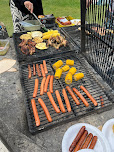Today was one of those days that reminded me why this trip is so special—filled with inspiration, good food, and even better company. We’re now in Lausanne, Switzerland, and this beautiful lakeside city has such a peaceful energy, even with a packed itinerary. The highlight of the day was hands down our visit to the Olympic Museum, which completely blew me away.
Walking through the museum was like stepping into the heart of Olympic history. From ancient origins to modern-day events, it was all beautifully curated and immersive. But my favorite part by far was the exhibit on Opening Ceremony costumes. I was absolutely mesmerized by how the outfits reflected the culture, creativity, and symbolism of each nation.
One of the displays that stopped me in my tracks was a pair of Christian Louboutin sandals that had been worn by Cuban athletes during the 2016 Rio Opening Ceremony. Seeing a designer piece like that used in a sporting context was such a cool crossover—it felt like my two worlds of fashion and sports collided in the best way. I couldn’t get over the detail and boldness of the design. It was such a powerful reminder that fashion isn’t just about looks—it’s about identity, performance, and pride.
After we wrapped up at the museum (and took a million photos in front of the Olympic rings, of course), we headed over to a local grocery store to prep for a group picnic. Honestly, the process of shopping together was part of the fun. We picked up a random but perfect assortment of food—hot dogs, buns, corn, chips, cheese, and some sweet snacks for later. Everyone grabbed a few items and helped carry bags down to our picnic spot, which overlooked the lake and mountains.
We spent the afternoon grilling and relaxing. The hot dogs were simple but hit the spot, and the corn turned out surprisingly great on the grill. It felt so wholesome to just sit in a circle on the grass, listening to music, laughing, and enjoying the view. After several busy days of running around cities and sightseeing, the slower pace was really refreshing.
Once we finished up, we took a walk back home, still buzzing from the good vibes. The weather was perfect—just warm enough with a soft breeze. The whole day felt like summer in the best way.
Later that evening, a group of us grabbed dinner at Holy Cow, a local burger place not far from our hotel. I had heard great things about it, and it definitely lived up to the hype.
Switzerland is already proving to be such a hidden gem on this journey. I feel so lucky to experience these small but meaningful moments—and I already know today will be one I look back on with a full heart.




